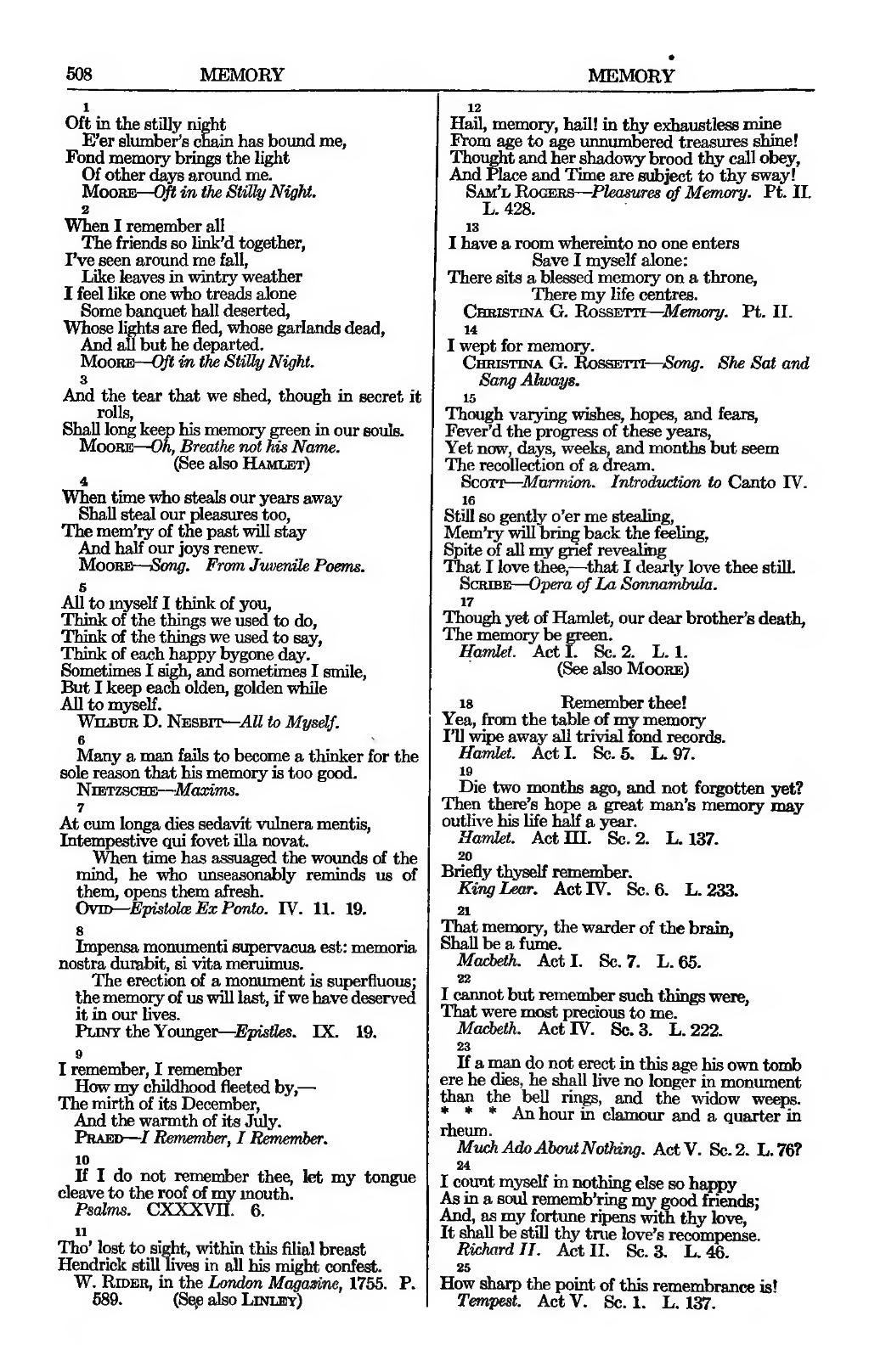508 MEMORY MEMORY
Oft in the stilly night
E'er slumber's chain has bound me,
Fond memory brings the light
Of other days around me.
Moore—Oft in the Stilly Night.
When I remember all
The friends so link'd together,
I've seen around me fall,
Like leaves in wintry weather
I feel like one who treads alone
Some banquet hall deserted,
Whose lights are fled, whose garlands dead,
And all but he departed.
Moore—Oft in the Stilly Night.
And the tear that we shed, though in secret it
rolls,
Shall long keep his memory green in our souls.
Moore-—Oh, Breathe not his Name.
| seealso = (See also Hamlet)
| topic =
| page =
}}
{{Hoyt quote
| num =
| text = <poem>When time who steals our years away
Shall steal our pleasures too,
The mem'ry of the past will stay
And half our joys renew.
Moore—Song. From Juvenile Poems.
| author =
| work =
| place =
| note =
| topic =
| page =
}}
{{Hoyt quote
| num = 5
| text = All to myself I think of you,
Think of the things we used to do,
Think of the things we used to say,
Think of each happy bygone day.
Sometimes I sigh, and sometimes I smile,
But I keep each olden, golden while
All to myself.
Wilbur D. Nesbit—All to .
Many a man fails to become a thinker for the
sole reason that his memory is too good.
Nietzsche—Maxims.
At cum longa dies sedavit vulnera mentis,
Intempestive qui fovet ilia novat.
When time has assuaged the wounds of the
mind, he who unseasonably reminds us of
them, opens them afresh.
Ovid—Epistole Ex Ponto. IV. 11. 19.
Impensa monumenti supervacua est: memoria
nostra durabit, si vita meruimus.
The erection of a monument is superfluous;
the memory of us will last, if we have deserved
it in our lives.
Pliny the Younger—Epistles. EX. 19.
I remember, I remember
How my childhood fleeted by,—
The mirth of its December,
And the warmth of its July.
Praed—/ Remember, I Remember.
If I do not remember thee, let my tongue
cleave to the roof of my mouth.
Psalms. CXXXVII. 6.
Tho' lost to sight, within this filial breast
Hendrick stilllives in all his might confest.
W. Rider, in the London Magazine, 1755. P.
589.
| seealso = (See also {{sc|Linley)
Hail, memory, hail! in thy exhaustless mine
Prom age to age unnumbered treasures shine!
Thought and her shadowy brood thy call obey,
And Place and Time are subject to thy sway!
Sam'l Rogers—Pleasures of Memory. Pt. II.
L. 428.
I have a room whereinto no one enters
Save I myself alone:
There sits a blessed memory on a throne,
There my life centres.
Christina G. Rossetti—Memory. Pt. II.
I wept for memory.
Christina G. Rossetti—Song. She Sat and
Sang Always.
Though varying wishes, hopes, and fears,
Fever'd the progress of these years,
Yet now, days, weeks, and months but seem
The recollection of a dream.
Scott—Murmion. Introduction to Canto IV.
Still so gently o'er me stealing,
Mem'ry will bring back the feeling,
Spite of all my grief revealing
That I love thee,—that I dearly love thee still.
Scribe—Opera of La Sonnambvla.
Though yet of Hamlet, our dear brother's death,
The memory be green.
Hamlet. Act I. Sc. 2. L. 1.
| seealso = (See also {{sc|Moore)
is Remember thee!
Yea, from the table of my memory
I'll wipe away all trivial fond records.
Hamlet. Act I. Sc. 5. L. 97.
Die two months ago, and not forgotten yet?
Then there's hope a great man's memory may
outlive his life half a year.
Hamlet. Act III. Sc. 2. L. 137.
Briefly thyself remember.
King Lear. Act IV. Sc. 6. L. 233.
That memory, the warder of the brain,
Shall be a fume.
Macbeth. Act I. Sc. 7. L. 65.
I cannot but remember such things were,
That were most precious to me.
Macbeth. Act IV. Sc. 3. L. 222.
If a man do not erect in this age his own tomb
ere he dies, he shall live no longer in monument
than the bell rings, and the widow weeps.
- * * An hour in clamour and a quarter in
rheum.
Much Ado About Nothing. Act V. Sc. 2. L. 76?
I count myself in nothing else so happy
As in a soul rememb'ring my good friends;
And, as my fortune ripens with thy love,
It shall be still thy true love's recompense.
Richard II. Act II. Sc. 3. L. 46.
How sharp the point of this remembrance is!
Tempest. Act V. Sc. 1. L. 137.
